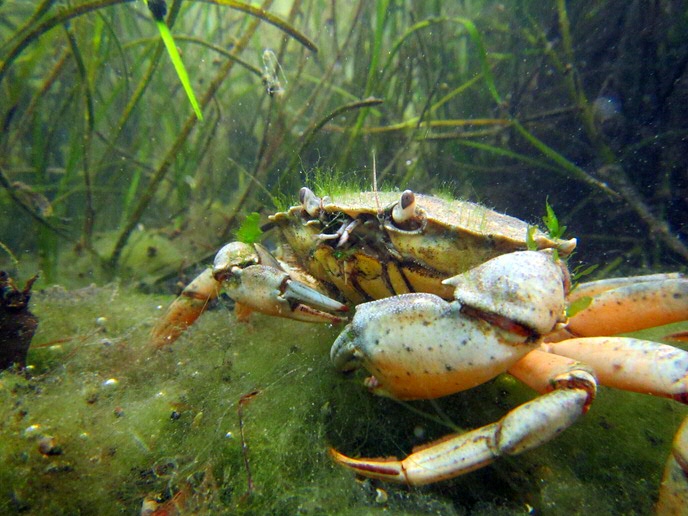Herstel van zeegras bedreigd door schimmel

Nederlandse onderzoekers hebben ontdekt dat zeegraszaad sterft door een waterschimmel die verwant is aan de bekende aardappelziekte. De schimmel - die nooit eerder in zeewater is ontdekt - belemmert de zaadkieming en daarmee ook het zeegrasherstel. De biologen, waaronder Laura Govers van de Rijksuniversiteit Groningen, publiceren hun resultaten op 24 augustus 2016 in Proceedings of the Royal Society B.
De schuldige zeewaterschimmels (Phytophthora gemini en Halophytophthora sp. Zostera) blijken leden van de grote Phytophthora-familie, waar ook de bekende aardappelziekte toebehoort. Deze richt grote schade aan in de land- en tuinbouw: ook aardappels, druiven, eiken in California en eucalyptusbomen in Australië hebben er last van.
Belangrijk ecosysteem
De huidige resultaten kwamen aan het licht tijdens zeegrasherstelproeven in de Waddenzee en de Grevelingen, maar de schimmel blijkt op veel meer locaties in Europa en Amerika voor te komen. De internationale aanwezigheid van de ziekteverwekker bedreigt dus wereldwijd het herstel van zeegrasvelden. Een probleem dat aandacht verdient, want deze kustecosystemen zijn net zo belangrijk als koraalriffen: ze vormen kraamkamers voor verschillende vissoorten, verhogen de biodiversiteit en dragen bij aan kustbescherming door de golfslag te dempen.
Vrijwel 100% besmet
Tegenvallende kieming van zeegraszaad dat op het Waddeneiland Sylt was verzameld voor het herstelproject, was aanleiding voor dit onderzoek. Bijna honderd project van dit zaad bleek besmet met Phytophthora. Hoofdonderzoeker Laura Govers, werkzaam bij de Rijksuniversiteit Groningen en de Radboud Universiteit, testte de kiemkracht van de besmette zaden. ‘Deze bleken zes keer minder vaak te kiemen dan niet-besmet zaad. Slechts drie tot vier procent van alle besmette zaden kiemde.’
Uit Nederland verdwenen
De afgelopen decennia zijn er wereldwijd veel zeegrasvelden hard achteruitgegaan. In Nederland zijn de uitgestrekte zeegrasvelden die oorspronkelijk in de Waddenzee stonden na 1930 verdwenen en nooit meer teruggekomen. Deze velden vormden een belangrijke kraamkamer voor vissoorten zoals haring en droegen bij aan de hoge biodiversiteit van het gebied. Ook maakten ze het water helderder en droegen ze bij aan kustbescherming door de golfslag te dempen.
Koperbehandeling
Daarom onderzoeken biologen of zeegrasherstel in de Nederlandse Waddenzee mogelijk is. Een manier om de kansen voor zeegrasherstel te vergroten is door de zaden tijdens opslag te behandelen met koperoplossing. Die methode wordt al sinds de 19e eeuw in de landbouw ingezet tegen Phytophthora-besmetting en lijkt ook veelbelovend voor zeegraszaad.
Het onderzoeksproject is een samenwerking van de Rijksuniversiteit Groningen, Radboud Universiteit, NIOZ, the Fieldwork Company en het Virginia Institute of Marine Science en werd gefinancierd door Natuurmonumenten, Rijkswaterstaat en de NVWA.
Publicatie
Laura L. Govers, Willem A. Man in 't Veld, Johan P. Meffert, Tjeerd J. Bouma, Patricia C. J. van Rijswick, Jannes H. T. Heusinkveld, Robert J. Orth, Marieke M. Van Katwijk en Tjisse van der Heide
Marine Phytophthora species can hamper conservation and restoration of vegetated coastal ecosystems
Proceedings of the Royal Society B , 2016; DOI http://dx.doi.org/10.1098/rspb.2016.0812

Meer nieuws
-
17 februari 2026
De lange zoektocht naar nieuwe fysica
-
10 februari 2026
Waarom slechts een klein aantal planeten geschikt is voor leven
